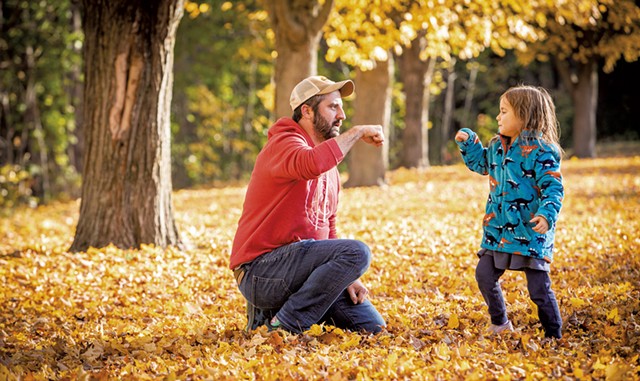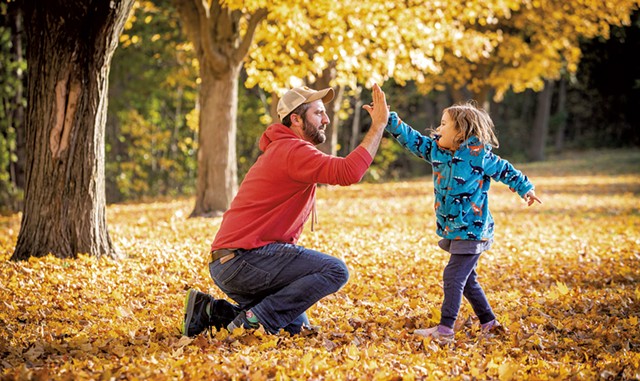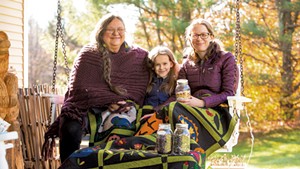
- Cat Cutillo
- Keegan Albaugh and his daughter modeling different ways to say goodbye.
"Oh, be nice. Go give your aunt a hug."
We've likely all heard some version of that instruction — or said it to our kids — when gathering with extended family. Hugs and kisses can be a way of establishing intimacy with loved ones. But sometimes those encounters can be awkward, especially if the child resists or feels uncomfortable hugging someone whom they don't know well.
Should you pressure your child to give hugs? With the holidays just around the corner, it's an important topic for caregivers to consider — especially this year, when many of us will likely be returning to the world of family gatherings after skipping them in 2020. This means that some relatives may be craving hugs from little ones, while children may feel even more uncomfortable giving them.
I think of these encounters as a great opportunity to start teaching kids about the concept of consent.
When this topic comes up, I usually start picturing college campuses and the stories of sexual assault survivors. I imagine I'm not alone. According to research from the Rape, Abuse & Incest National Network, "among undergraduate students, 26.4 percent of females and 6.8 percent of males experience rape or sexual assault through physical force, violence or incapacitation," and 23.1 percent of transgender, genderqueer or nonconforming college students have been sexually assaulted.
I didn't really start talking about consent and sex until college, when student-led groups on campus raised awareness about it. But over the years, I've learned that consent isn't just about sex — and we can broach the topic with our children much, much earlier.
Every day, children face situations regarding consent: Should I let my friends share my French fries? Do I want to play tag right now? Am I comfortable with my friend wearing my hat? They all involve setting boundaries, making choices and advocating for oneself. By discussing these topics with children and providing them with the tools for addressing similar scenarios, we're empowering them to take charge of their own bodies, and to respect the words and boundaries of others.
Comments like the one at the beginning of this column usually come from a good place: relatives wanting to share their love with one another. And, let's be honest, hugs from little kids are so sweet. It's easy to understand why folks would want to get one before saying goodbye. But forcing children to exchange hugs and kisses with others sends the message that it's more important to please other people than to listen to and act on their own thoughts.
It's understandable that the topic of consent could potentially stir up a lot of different thoughts and feelings. Here are some tips to help you and your family navigate — and prevent — those uncomfortable encounters this holiday season.

- Cat Cutillo
- Keegan Albaugh and his daughter modeling different ways to say goodbye.
Front-load the experience. Talk with your child about what to expect at each gathering — who will be there; how many people; whom they may or may not feel comfortable giving a hug to — and come up with a plan or secret signal they can use to indicate they would like additional support. Additionally, talk with relatives about how your child is feeling, and let them know what your child may not feel comfortable with ahead of time.
Advocate for your child. When you notice that your child is having difficulty, or when something awkward happens and they don't feel comfortable speaking up, you or other adults should address unwanted boundary crossing, even if it makes you feel uncomfortable.
Give kids choices. Instead of saying, "Give me a hug goodbye," try "How would you like to say goodbye?" If a child struggles to think of something, offer them a few alternatives. Hugs, high-fives, fist bumps, waves and silly dances are all solid options.
Don't take it personally. When a child doesn't want to give you a hug, realize that it isn't about you. It's more important to honor what makes a child feel comfortable than to focus on your own joy of receiving a hug.
Think of other ways to connect. Try playing a board game or asking kids questions about their favorite book. You can also dance together, shoot some hoops, draw pictures, or look up and memorize silly jokes.
Seek out additional resources. I highly recommend Consent (for Kids!): Boundaries, Respect, and Being in Charge of You by Rachel Brian. It's a great book for young children, as well as adults.
Dropping off my daughters at school over the past couple of months, I've been making an effort to ask, "How would you like to say goodbye today?"
I love getting squeezes from my children before they run into their classrooms, but I've also really been enjoying watching my kids pause and actively think about what they want. I want them to know that the choice is always theirs.








Comments
Comments are closed.
From 2014-2020, Seven Days allowed readers to comment on all stories posted on our website. While we've appreciated the suggestions and insights, right now Seven Days is prioritizing our core mission — producing high-quality, responsible local journalism — over moderating online debates between readers.
To criticize, correct or praise our reporting, please send us a letter to the editor or send us a tip. We’ll check it out and report the results.
Online comments may return when we have better tech tools for managing them. Thanks for reading.